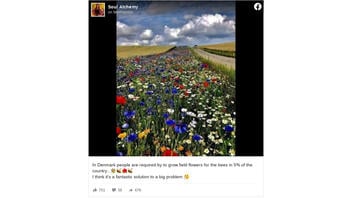
Does Denmark require its citizens to grow field flowers for bees using 5% of the country's land? No, that's not true: Although Denmark has biodiversity measures in place and there are recommendations for measures to help bees, a spokesman for the Danish Agriculture & Food Council said the claim of such a requirement is "not correct."
The claim appeared in a Facebook post (archived here) published on July 21, 2021. It featured a picture of flowers in a field and the caption read:
In Denmark people are required by to grow field flowers for the bees in 5% of the country...💐🐝🌺🐝
I think it's a fantastic solution to a big problem 🤔
This is what the post looked like on Facebook on July 26, 2021:
(Source: Facebook screenshot taken on Mon Jul 26 14:22:25 2021 UTC)
According to the Biodiversity Information System for Europe, Denmark's policies for fostering biodiversity do not include planting field flowers using 5% of the country's land. A search for "bees" and "field flowers" on the Ministry of Environment of Denmark's website did not include any results about mandatory flower-growing policies.
However, the European Union has established a "green direct payment" (or "greening") for farmers. The payment:
...supports farmers who adopt or maintain farming practices that help meet environmental and climate goals. Through greening, the European Union (EU) rewards farmers for preserving natural resources and providing public goods, which are benefits to the public that are not reflected in market prices.
EU countries have to allocate 30% of their income support to "greening".
To receive the payment, the countries have to comply with three mandatory practices, one of which is to:
dedicate 5% of arable land to areas beneficial for biodiversity: Ecological Focus Areas (EFA), for example trees, hedges or land left fallow that improves biodiversity and habitats.
In a July 24, 2021 email to Lead Stories about the field flowers claim, Thyge Hansen, press adviser for the Danish Agriculture & Food Council, said:
The claim is not correct.
The Danish Agriculture & Food Council recommend our members to take measures to help the bees. One of these measures is planting flowers. But it is not a legal requirement.
Lead Stories also received a response from Alan Matthews, professor emeritus of European agricultural policy at Trinity College Dublin, on July 24, 2021:
I do not have precise information on the Danish rules, but under EU Common Agricultural Policy rules all arable farms with an arable area more than 15 ha must devote at least 5% to 'ecological focus areas' which are intended to be space for nature. I guess this is where the author gets his 5% figure from. Unfortunately, it is not the case that these areas only consist of wild flower areas for pollinators. A wide range of options are available to farmers, including leaving the land fallow, landscape features, catch crops, buffer strips but also planting leguminous crops (although Denmark did not allow farmers to choose this latter option). In Denmark, catch crops account for more than half of the total area.
Matthews sent a report from the European Commission confirming the catch crops statistic, which can be found here (archived here). Catch crops are fast-growing crops grown between plantings of a main crop in order to prevent bare-field erosion.













